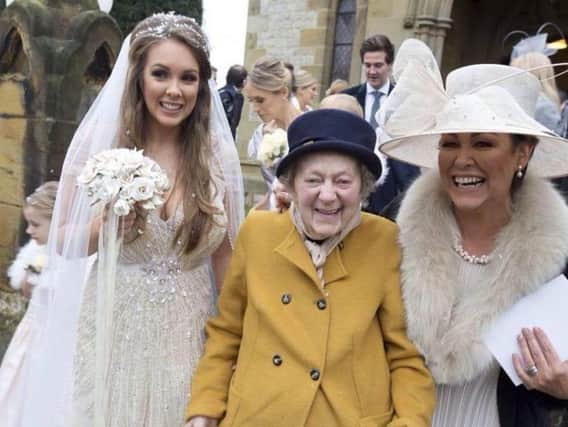My mother's heartbreaking fight with dementia - and our appalling struggle to get NHS funding for her care: Christa Ackroyd


At a cost of £700 a week she had already spent more than £30,000 of her life savings paying for her care. The conclusion was she just wasn’t sick enough to receive financial support. I burst into tears and then I got angry.
It was ten years before that Mum had been diagnosed with vascular dementia. A series of mini-strokes had destroyed part of her brain and continued to do so. What was the tragedy was that mum knew it too. It started with her asking why she was getting muddled and ended with her slumped in a chair in a nursing home unable to speak a word that made sense.
Advertisement
Hide AdAdvertisement
Hide AdFor years after diagnosis, at which point by the way she cried, she had continued to live an independent life, struggling with an ever deteriorating memory but determined she would end her days in the humble semi in Bradford she had shared with dad all their married life.


She walked every day to Morrison’s to keep herself fit. She wrote endless lists and notes to herself to remind her to do the simplest of things like how to lock the door or answer the telephone and we muddled through. Then five years later things took a serious turn for the worse. A diagnosis of Alzheimer’s proved what she already knew.
She could no longer look after herself. So after some persuading she accepted that which she had never done - help. She agreed to meals on wheels and three daily half hour visits from carers part funded by her and part funded by the council. And they were wonderful.
They ensured she was fed and clean and that she took her medication. They helped her for three and a half years. Then we reached crisis point. One day she went out for a walk and couldn’t remember who she was or where she lived. Fortunately when police arrived, a neighbour well used to seeing her out and about recognised her and she was taken home. From that day on fortunately for us she never went out alone again.


Advertisement
Hide AdAdvertisement
Hide AdBut she fell. She fell getting out of bed. She fell from her chair. She fell walking to the kitchen. She fell right in front of me but more often than not she fell when she was alone. I lost count of the times the morning carers rang to say she had been found on the floor still wearing her emergency pendant but without the ability to remember to press it. Time and time again she went to hospital.
She was frightened but couldn’t say why. She was angry and lashed out but couldn’t say where it hurt. And she cried but couldn’t say why she was upset. But mum was always glad to get home. Until the last time.
Then she ran up and down the street in obvious distress. She wasn’t calmed by being in her own environment and she refused both medication and help. She didn’t know who she was or where she was. That was when social services and the doctors stepped in and said she needed full time care and nursing care at that. It was a terrible decision but fortunately it was taken out of our hands.
The nursing home I eventually found was wonderful. But it cost thousands a month. Her condition slowly deteriorated and I asked for a nursing assessment to help fund it. That took more than nine months of constant chasing and begging.
Advertisement
Hide AdAdvertisement
Hide AdAnd so we had come to this. A complete stranger with an hour to spare who had never known my mum and had apparently not even read her well documented long journey of decline declared she was fine.
She simply wasn’t ill enough to receive help was the conclusion. “Has she fallen in the last six weeks?”,was the first question. Well no, was my reply, because she was under constant supervision right by the nurses station. But she would if she wasn’t constantly readjusted in her chair.
“Was she happy?”, was another. Well no, was the answer. She is often distressed but can’t speak to tell us why. “Well she seems happy and calm enough”, came the retort. You mean just sat slumped and medicated in her chair, I said. I went on to list her ailments.
Sorry Mum you will hate this but it’s important I say it. Doubly incontinent. Serious heart condition. Unable to communicate or feed herself. Unable to walk unless aided by two people. Mood swings . In pain. Unable to swallow tablets. Prone to malnutrition (she had lost a stone and a half in ten days at the assessment home). And of course the medical diagnosis of both vascular dementia and Alzheimer’s.
Advertisement
Hide AdAdvertisement
Hide AdBut yes, I answered, she does recognise me with a smile. “That’s good”, said the assessor. “I have seen a lot worse.” That’s when I lost it. I burst into tears and refused to sign that I agreed with the assessment she should self fund. I won her case.
Five weeks later my lovely, bright, intelligent mother died holding my hand. She had been bedridden for ten days. She had received help with funding for the last three weeks of her life, a life spent as a widow for almost twenty years, a life of helping others, living frugally and saving for her old age and of being the kindest, sweetest woman who never had a bad word for others or had a bad word said about her. When she died I wanted to write to the authorities quoting Spike Milligan saying, ‘I told you she was ill.’ I didn’t. There didn’t seem much point. And mum hated ‘clever talk’.
This week that feisty wonderful actress Dame Barbara Windsor, who is fighting her own battle with Alzheimer’s, has launched a campaign to secure funding for people like my mum. And your loved ones too.
People, who she says, are being let down by the system. She is right. The National Health Service is committed to access based on clinical need not an ability to pay. And Alzheimer’s and dementia are medically diagnosed conditions that rob people of who they once were.
Advertisement
Hide AdAdvertisement
Hide AdTheir families should spend their last few years on earth being with them not fighting that system. Boris Johnson was happy enough to pose with Barbara when she was a high profile actress behind the bar at the Vic. Now he is Prime Minister he must listen to her campaign and accept we are letting down a generation who have never asked for anything, except to die with dignity and the help they deserve.
Have you or your family been affected by the issue of seeking NHS funding for dementia care? Contact [email protected] to share your experiences.
